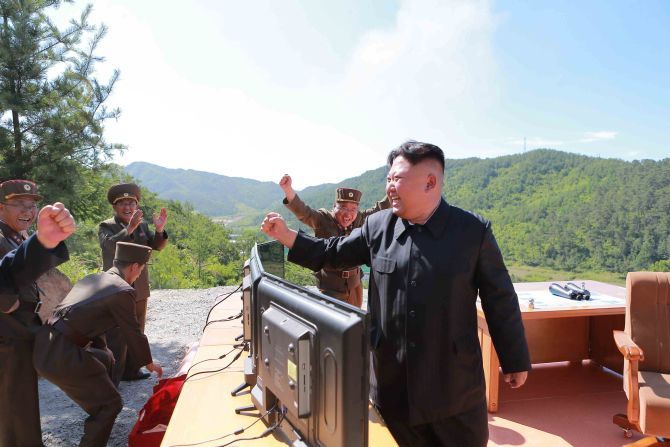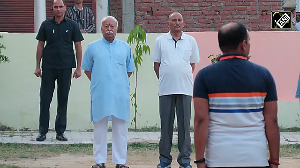After personally overseeing the test Kim Jong-un 'said American bastards would be not very happy with this gift sent on the July 4 anniversary', says KCNA.

The United States on Wednesday confirmed that North Korea test launched an intercontinental ballistic missile for the first time and warned of an ‘escalated threat’ from Pyongyang, while carrying out a joint missile drill with South Korea in response.
Meanwhile, North Korea’s official news agency said that the ICBM launched on Tuesday is capable of carrying a ‘large, heavy nuclear warhead’ that can survive re-entry into the Earth’s atmosphere.
Washington described the device, launched in a watershed moment for Pyongyang's weapons ambitions, as an ICBM, and independent experts said it was capable of reaching Alaska.

The Korean Central News Agency said that after personally overseeing the test, leader Kim Jong-un ‘said American bastards would be not very happy with this gift sent on the July 4 anniversary’, the United States’ independence day.
He ‘added that we should send them gifts once in a while to help break their boredom’.
In the show of strength that followed the ICBM launch, the US and South Korean soldiers fired missiles into the latter’s territorial waters on Tuesday to showcase their ‘precision fire capability’, chief Pentagon spokesperson Dana White said.
According to a statement by US forces in South Korea, the exercise ‘utilised the Army Tactical Missile System and the South Korea’s Hyunmoo Missile II, which fired missiles into territorial waters of South Korea along the East Coast’.

The Pentagon said that America’s commitment to the defence of its allies in the region -- South Korea and Japan -- in the face of threats is ‘ironclad’.
“The launch continues to demonstrate that North Korea poses a threat to the United States and our allies. Together with the Republic of Korea, we conducted a combined exercise to show our precision fire capability,” White said.
US Secretary of State Rex Tillerson, who confirmed the launch in a statement, said America would never accept a nuclear-armed North Korea.
“The United States strongly condemns North Korea’s launch of an intercontinental ballistic missile. Testing an ICBM represents a new escalation of the threat to the United States, our allies and partners, the region, and the world,” Tillerson said.
The US has also requested an emergency meeting of the UN Security Council, which is expected to take place on Wednesday.

“We intend to bring North Korea’s provocative action before the UN Security Council and enact stronger measures to hold the DPRK accountable,” Tillerson said.
He also called for ‘global action’ to stop a ‘global threat’.
“The US seeks only the peaceful denuclearisation of the Korean Peninsula and the end of threatening actions by North Korea,” he added.
At a White House event, US President Donald Trump, without mentioning North Korea, said that the US will handle its challenges. “We do have challenges, but we will handle those challenges. Believe me.”
With inputs from agencies






 © 2025
© 2025